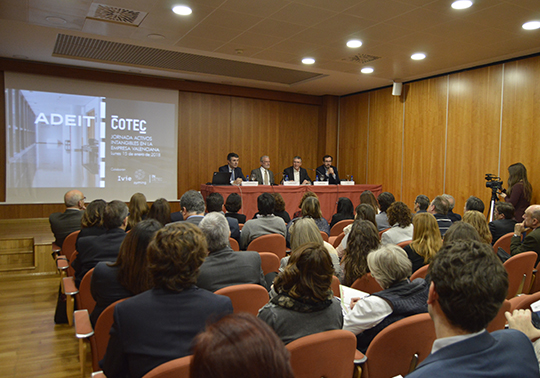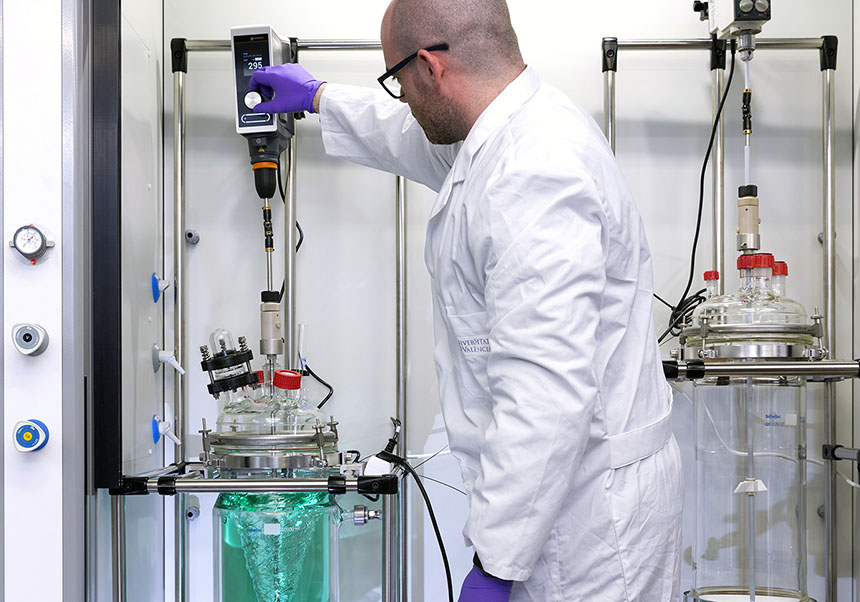The Comunitat Valenciana increases investment in intangible assets by 30% in 10 years and is close to the average
- Fundació Universitat-Empresa
- January 16th, 2018

The new information and communication technologies (ICT) are transforming production processes through robotization and automation and have led to the creation of new sectors in a context marked by globalization. These changes, which allow progress towards the knowledge economy, imply the need to increase investments in so-called intangible assets, those related to software, R & D, the organizational structure of companies, the formation of human capital, design, advertising or market studies.
Spain is moving towards this knowledge economy, albeit at a slower pace than other developed countries. Although national investment in intangible assets has grown by 22.5% since 2004, it still represents only 6.3% of GDP, which places Spain at the tail of Europe, along with Italy, and very far from countries such as Sweden, France or the United Kingdom, where it exceeds 12% of GDP. The importance of investing in intangible assets, directly related to the increase in productivity and quality of life, is observed in the US, the leading country in this regard, which already invests more in intangible assets than in tangible assets.
The Valencia Region started from very low positions in investment in intangibles, but since 2004 it has registered a growth of 30%, 7.5 points more than in the whole of the country. Investment in intangibles in autonomy represents 6.2% of GDP, which is practically equal to the national average. The crisis has boosted the intangibles, although the Valencian companies still stand out for the investment in tangible assets (real estate, machinery, etc.), where they are 6.5 percentage points (pp) above the national average.
These data come from the report The intangible economy in Spain. Evolution and distribution by territories and sectors (1995-2014), a study of the IVIE funded by the Cotec Foundation within the framework of its Open Innovation Program. The report's directors, Matilde Mas and Javier Quesada, both professors of Economic Analysis and Ivie researchers, presented this morning in the ADEIT Foundation the conclusions of the document focused on the analysis of the Valencian case, in a conference organized by Cotec and ADEIT. The rector of the Universitat de València, Esteban Morcillo; and the Minister of Sustainable Economy, Productive Sectors, Trade and Labor, Rafael Climent; they were in charge of inaugurating the event, together with the president of the University-Business Foundation ADEIT, Juan Manuel Pérez; and the general director of COTEC, Jorge Barrero.
By types of intangible assets, the Comunitat Valenciana invests more than the national average in market and advertising studies, 13.6 and 11.6 pp more, respectively. However, it is 20 pp lower in investment in other assets such as training of workers by the company and in design.
Investment in intangible assets over GDP in the CV. Spain = 100. Average 2004-2014
Source: Cotec-Ivie Foundation, BBVA-Ivie Foundation and INE
Specifically, the investment in intangible assets of the Comunitat Valenciana reached 6,221.1 million euros in 2014 (last year available). Software and R & D concentrate 40% of the total, followed by advertising and organizational structure, which represent 16.5% and 15.4%, respectively. The assets to which less investment is allocated are market studies (3.4%) and mining prospecting and original recreational, literary or artistic works (5%).
Percentage structure of intangible investment by assets. Valencian Community. 2014
In terms of sectors, financial and insurance activities, the manufacture of machinery and the manufacture of computer products are those that most bet on intangible investment in the Valencian Community, while agriculture and livestock and public administration and defense are those that they are well below average.
The report presented today in Valencia offers the first database of investment in intangible assets on an international scale that includes the analysis of the regions within the same country. It studies the investment in intangibles by Spanish autonomous communities between 1995 and 2014 and divides them into four blocks based on the result: converging, diverging, reinforced leadership and stagnating leadership.
In the autonomies as a whole, Madrid has strengthened its leading position in intangible assets over the last ten years, while Catalonia and Navarra, which were located in outstanding places, have slowed down their progression.
The Comunitat Valenciana started from very low positions in investment in intangibles, but, together with Andalusia and Murcia, they have shown a progression that begins to bring them closer to the national average. Finally, Extremadura and La Rioja have moved a little more than average in this last decade.
After the presentation of the report prepared by the Ivie researchers for the COTEC Foundation, the representatives of the Valencian companies Ayming and INDETEC have exposed the particular case of the management of intangible assets in the company.
ADEIT-Cotec link
ADEIT, in its mission to promote the management of innovation, belongs to the Board of Trustees of the COTEC Foundation. This foundation, chaired by Cristina Garmendia, serves, since 1990, as an observatory of R + D + I in Spain, and provides analysis and advice on innovation, technology and economics. In addition, it has been established as an agent of change that contributes to the development of the Spanish economy and society.
https://www.youtube.com/watch?v=QxX6PK3r-Yw&feature=youtu.be


















